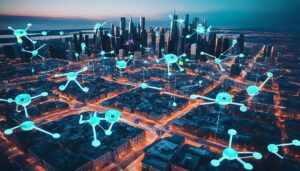
AI-driven technology is revolutionizing the field of climate change research, offering powerful tools and solutions to understand and mitigate the impacts of global warming. From data analysis to modeling and prediction, AI is playing a crucial role in advancing our understanding of the complex systems that drive climate change. By harnessing the power of machine learning algorithms, researchers are able to process vast amounts of environmental data and uncover patterns and relationships that were previously unseen. This article explores the transformative role of AI in enhancing climate change research and highlights some key applications and benefits of this technology in the field of environmental science.
Key Takeaways:
- AI-driven technology is transforming climate change research by providing powerful tools for data analysis and prediction.
- Machine learning algorithms are enabling scientists to uncover patterns and relationships in environmental data.
- AI-driven models are improving the accuracy of climate change projections and informing effective strategies for adaptation and mitigation.
- AI is also offering innovative solutions in renewable energy, sustainable agriculture, and climate-smart cities.
- Ongoing research and innovation in AI hold immense promise for a more resilient and sustainable future.
The Power of AI in Climate Data Analysis and Modeling
AI technologies are revolutionizing the field of climate research, particularly in the areas of data analysis, modeling, and predictive analytics. By harnessing the capabilities of machine learning algorithms, researchers are able to delve into large-scale climate data and uncover valuable insights about the factors driving climate change.
Machine learning algorithms are designed to identify patterns and correlations within vast datasets, enabling scientists to pinpoint the key drivers of climate variability. This allows for more accurate predictions of future trends in temperature changes, sea-level rise, and extreme weather events.
I firmly believe that AI-driven models have immense potential in providing policymakers and stakeholders with the necessary tools to make informed decisions on climate adaptation and mitigation strategies. By having access to more accurate projections and insights, we can develop effective approaches to combat the impacts of climate change.
Predictive analytics, powered by AI, helps generate climate scenarios and assess the potential impacts of various mitigation measures. This enables researchers to evaluate the effectiveness of different interventions and inform the development of climate policies.
To highlight the importance of AI in climate data analysis and modeling, consider the following table:
| AI Applications | Benefits |
|---|---|
| Identifying climate drivers | Enhanced understanding of climate change processes |
| Predicting future climate trends | Accurate projections for policymaking and climate adaptation |
| Evaluating mitigation measures | Informed decision-making for effective interventions |

As we continue to harness the power of AI in climate research, there is great potential for further advancements in understanding and mitigating the impacts of climate change. By leveraging AI technologies, we can work towards creating a more sustainable and resilient future.
Advancements in AI for Climate Change Solutions
AI technologies are not only helping us understand the complex dynamics of climate change but also offering innovative solutions to mitigate its impacts. In the realm of renewable energy, AI algorithms are being used to optimize the generation and distribution of energy from renewable sources, improving the efficiency and reliability of clean energy systems.
AI is also being applied to sustainable agriculture, helping farmers optimize irrigation, crop management, and pest control, reducing resource consumption and enhancing food production resilience in the face of climate change. By leveraging AI technologies, farmers can make data-driven decisions to maximize yields while minimizing the environmental impact.
Additionally, AI is aiding in the development of climate-smart cities by optimizing energy usage, transportation systems, and urban planning to reduce carbon emissions and create more livable and sustainable urban environments. With AI-powered systems, cities can effectively monitor and manage energy consumption, leading to reduced greenhouse gas emissions and improved air quality.
The potential of AI in addressing climate change challenges is vast, and ongoing research and innovation in this field hold immense promise for a more resilient and sustainable future. By harnessing the power of AI for climate change mitigation, renewable energy, and sustainable agriculture, we can work towards a greener and more sustainable planet for generations to come.
FAQ
How is AI being used in climate change research?
AI is being used in climate change research for data analysis, modeling, and prediction. It helps researchers process vast amounts of environmental data and uncover patterns and relationships that were previously unseen.
What insights can AI provide in climate change research?
AI can provide valuable insights into the factors driving climate change by identifying patterns and correlations in large-scale climate data. It helps scientists understand climate variability and predict future trends with greater accuracy.
How does AI contribute to climate adaptation and mitigation?
AI contributes to climate adaptation and mitigation by providing more accurate projections of temperature changes, sea-level rise, and extreme weather events. It helps policymakers and stakeholders make informed decisions and develop effective strategies.
Are there any applications of AI in renewable energy?
Yes, AI is being used to optimize the generation and distribution of energy from renewable sources. It improves the efficiency and reliability of clean energy systems.
How can AI be applied to sustainable agriculture?
AI can help farmers optimize irrigation, crop management, and pest control, reducing resource consumption and enhancing food production resilience in the face of climate change.
Can AI contribute to the development of climate-smart cities?
Yes, AI can optimize energy usage, transportation systems, and urban planning to reduce carbon emissions and create more livable and sustainable urban environments.
What is the potential of AI in addressing climate change challenges?
The potential of AI in addressing climate change challenges is vast. Ongoing research and innovation in this field hold immense promise for a more resilient and sustainable future.
Source Links
- https://blizzardwatch.com/
- https://game-news24.com/2024/03/01/explore-the-wild-landscapes-of-expedition-a-mudrunner-game-and-its-a-good-idea-to-get-out/








